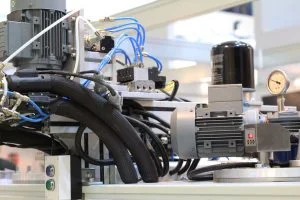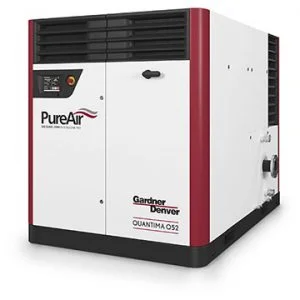
In the realm of industrial machinery, precision and expertise are paramount, especially when it comes to troubleshooting complex systems like Gardner-Denver ElectraSaver air compressors. At PYE-BARKER Engineered Solutions, we pride ourselves on our certified technicians who possess the knowledge and experience to address even the most intricate issues that arise.
When a customer recently encountered problems with multiple 300 horsepower Gardner-Denver ElectraSaver air compressors, our team sprang into action. Despite initial diagnoses from external sources suggesting an issue with the airend, our service manager suspected otherwise. Rather than immediately opting for costly replacements, a thorough inspection was deemed necessary.
Upon inspection, a seemingly minor fault—a faulty disc on the inlet valve—was discovered. This seemingly insignificant component was the root cause behind the compressor's erratic behavior, triggering overloads and shutdowns upon startup. Had this issue not been accurately diagnosed and addressed, the consequences could have been dire, leading to both financial losses and operational downtime.
At PYE-BARKER, our commitment extends beyond mere repairs; we believe in empowering our clients. Our service manager took the initiative to educate the on-site mechanics, equipping them with the skills to identify and rectify such issues independently. By fostering this culture of knowledge sharing, we enable our clients to mitigate future risks and optimize the performance of their machinery.
The case of the Gardner-Denver ElectraSaver air compressors underscores the importance of investing in certified technicians. While immediate solutions may seem tempting, a thorough diagnosis by knowledgeable professionals can lead to substantial long-term savings. By addressing underlying issues accurately, businesses can avoid unnecessary expenditures on premature replacements and minimize costly downtime.
 3 Types of Filters for Your Compressed Air System
3 Types of Filters for Your Compressed Air SystemAir quality is paramount in industrial operations, particularly when it comes to compressed air systems. Just as vehicles require specific tires for different terrains, compressor systems demand tailored filtration for optimal performance. Let's delve into the three primary types of filters and their respective applications.
Particulate filters play a crucial role in eliminating dust and particles from the air, ensuring unhindered airflow within the piping system while mitigating the risk of clogs. These filters employ a membrane as the primary filtration element, functioning akin to a gate that permits air passage while obstructing larger particles.
Coalescing filters are designed to capture oil and minute moisture droplets, preventing condensate formation within the system. By preserving the integrity of piping systems and components, these filters effectively extend their operational lifespan. While airflow manipulation is the primary mechanism, some coalescing filters may integrate a membrane element to facilitate condensate and oil separation.
Activated carbon filters excel in eliminating odors and vapors, making them indispensable in industries such as food processing and air production for breathing purposes. Leveraging carbon's exceptional adsorption capabilities due to its expansive surface area, these filters attract and retain contaminants, ensuring cleaner air output.
Remember, the efficiency of an air filter is reflected in its pressure drop and the ability to maintain airflow while effectively capturing pollutants. Over time, filter accumulation can elevate pressure drop, leading to increased costs and diminished productivity. Regular filter replacement is imperative to sustain optimal performance.
If you are not using the correct oil in your air compressor you can significantly damage your compressor parts leading to costly repairs and down time. To reduce the risk of a compressor malfunction, keep the oil reservoir and compressor components clean by sampling and changing the oil on a regular basis. Be sure you always use the proper weight and grade oil specified by the manufacturer.
Often I get the question “How long will my compressor oil last?” This really depends on several factors including application, cleanliness of air, and type of oil used.
Discharge Temp Aeon 4000 Aeon 6000FG Aeon 9000SP Aeon 9000TH
Up to 180F 4000 Hours 4000 Hours 8000 Hours 8000 Hours
180F to 190F 3000 Hours 3000 Hours 6000 Hours 8000 Hours
190F to 200F 2000 Hours 2000 Hours 4000 Hours 8000 Hours
200F to 210F 1000 Hours 1000 Hours 2000 Hours 6000 Hours
Frequently Asked Questions about Mixing Oils
Can I top off the existing compressor oil with another oil?
Mixing two different oils is not recommended. When you mix two different oils you actually create a third oil. This resulting third oil may vary significantly depending on the mixing ratio, 50/50, 90/10, 10/90, etc. Additionally, these different oils have never been tested for extended periods of time so the expected oil life is not predictable.
Will I invalidate the compressor warranty by using aftermarket oils?
It is recommended that you use only the compressor manufacturer’s oil thru the warranty period. Oil manufactures can tell when their oil has been blended with something else. Contaminating one oil with another is typically grounds to invalidate a warranty.
Viking Pump is proud to announce the availability of the XPD 676 Series and the Universal 682 Series.
Engineered to API 676 Design Standards, the XPD 676 is the Industry’s first fully API 676 Compliant Internal Gear Pump.
Compliance to API 676 specification reduces the risk of emissions, leakage, corrosion and unplanned down time. Viking has 3 levels of API compliance through the following Pump Options:
The XPD 676 solution includes both mandatory and optional operational quality & functional testing. We also have full engineering documentation, testing and project management support available.


